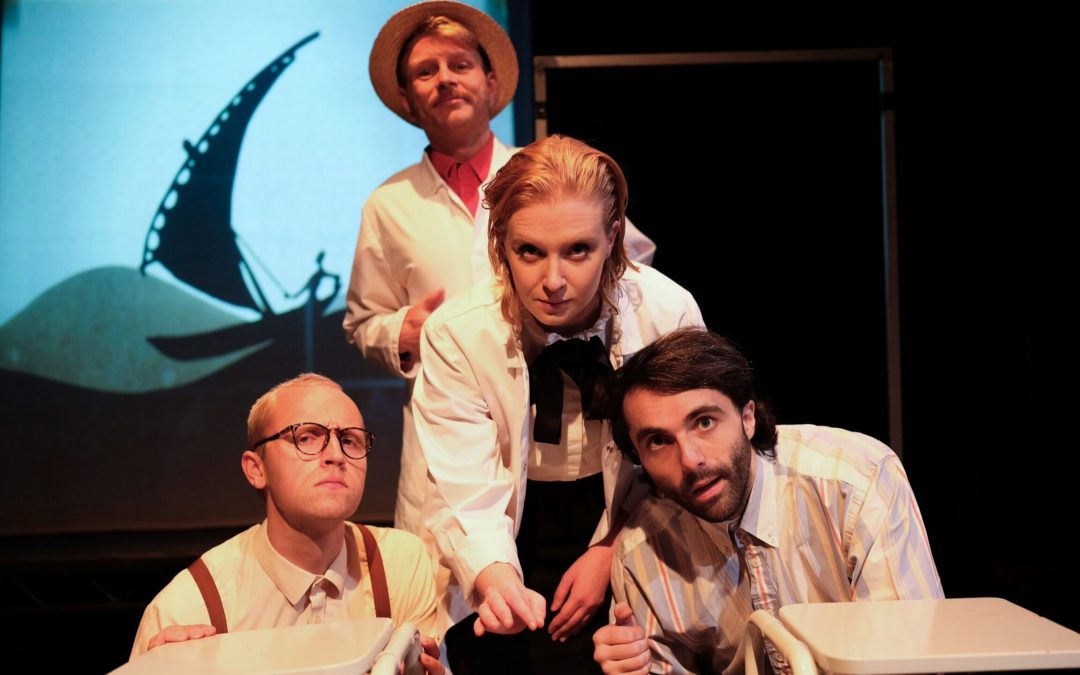Akimbo Theatre’s rambunctious retelling of animation pioneer Lotte Reiniger dazzles with energy, though its indulgences test patience.
The rough-and-ready, make-do-and-mend, why-not-try-this approach of the early animation pioneers is both the style and subject of Akimbo Theatre’s rambunctious retelling of the Lotte Reiniger story.
And it is quite a story. Lotte, played with bags of undaunted pluck by Lexie Baker, has a dream of turning her delicate silhouettes into the first full-length animated feature. We are in Germany in the early 1920s. Walt Disney is still years away from Sleeping Beauty.
But Lotte will not be dissuaded, despite the prevailing sexual politics of the time – and the rise of Nazism.
Her first encounter with her eventual collaborators is straight out of The Big Bang Theory: cloistered nerds, obsessing over their art, unaccustomed to – and not happy about – this brilliant bright girl in their midst, small scissors round her neck ready to cut a silhouette of exquisite delicacy at the drop of a hat.
They throw everything at it
But they succumb to her enthusiasm, vision and craft, and soon they embark on a four-year project to create The Adventures of Prince Achmed, a full-length epic compiled one frame at a time, a project that would push the boundaries of the possible. Along the way, Lotte invents the multiplane camera – providing depth – long before Disney popularised the concept.
The five-strong troupe – Baker, Owen Bleach, Halvor Tangen Schultz, Flo Wiedenbach and Richard Durning – devise and perform the piece under Rosanna Mallinson’s robust direction. They hurl themselves into the febrile world of interwar Berlin: violence, Schnapps, love, chaos, debauchery and storyboards.
The ensemble throw everything at the piece – dance, slapstick, caricature, screeching. Some of it works, some of it drags when the frayed edges become more of the piece than the piece itself. The cabaret scene, for one, is a seemingly endless indulgence we could do without. We hanker to return to the studio, where the artists’ work is cleverly projected on a screen, giving beguiling glimpses of what the fuss was all about.
It takes a sinister turn
The second half takes a more sinister turn as the Nazi censor sees degeneracy in the fairy tale. He tries both to seduce the filmmaker to the Nazi cause and to drive her there through blackmail. These scenes should have a long-lens-of-history feel, but they are horribly present and uncomfortably familiar.
This hotchpotch of styles, carnivals and cavorting sometimes tests our patience, but the performers are never less than committed and joyous. The little-known story is astounding and has a propulsive energy all its own.
Like giddy schoolchildren at the end of a sugar-rush day, the cast settles down before the big screen. Everyone falls quiet, everyone sits still, everyone stares up, open mouthed. In a moving and enchanting moment of wonder and connection, we see a prince sail across the storm-tossed Arabian seas once more.
Breathtaking.
The Animator runs at Southwark Playhouse Borough until 30 August 2025
This review first appeared on The Spy In The Stalls.

